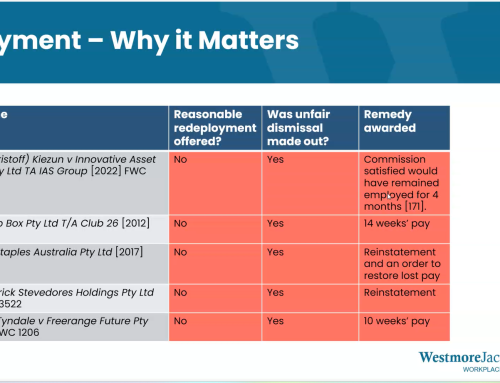A key part of being in business is managing risk and protecting your business interests. When it comes to your employees, one of the key ways to do this is through well drafted employment contracts.
All too often clients approach us where a former employee has brought a claim against the business. A common feature in such situations are poorly drafted employment contracts (or no contracts at all).
We also regularly advise in situations where a former employee has undertaken actions causing serious injury to the business, such as soliciting valuable clients post-employment. Where there are no express contractual obligations restraining the employee from taking these actions, it becomes legally difficult to provide an effective solution.
Here are our top 5 reasons why your business should have adequate employment contracts.
1. Preventing a successful reasonable notice claim
A common weakness we see in employment contracts is the failure to specify a period of notice
by which the employer can end the employment relationship. In these situations, an employee can bring a claim for reasonable notice.
Alternatively, some contracts refer to the notice provisions set out in section 117(3) of the Fair Work Act 2009 (Cth) (“FW Act”). Such contract terms may be insufficient to avoid a successful claim for reasonable notice. This is because the FW Act only provides for a minimum period of notice.
Where the contract is silent on the issue of notice, or has deficiencies by referring to the minimum notice periods in the FW Act, an employee whose employment has ended can bring a claim for reasonable notice at common law.
This is because reasonable notice will be implied by law into employment contracts which do not have an express term dealing with notice.
Depending on factors such as the employee’s seniority and length of service, a Court may consider that up to 12 months’ notice is reasonable. If this is the case, then the business must pay damages equivalent to the employee’s salary for that notice period.
The cases show that the simple omission of a correctly drafted notice term can be costly.
2. Protecting your clients through post-employment restraints
The capacity to retain existing clients is often crucial for a business’s survival. It is therefore important that businesses take proactive steps to protect their interests in this regard.
One of the best ways to reduce the risk of ex-employees taking your clients is to include post-employment restraints in an employment contract. Types of post-employment restraints include:
- non-compete;
- restraint on the provision of services to clients;
- non-solicitation of clients; and
- non-solicitation of employees and/or contractors.
However, enforcing post-employment restraints against ex-employees is often difficult.
This is particularly so if there are weaknesses in the wording of the restraints.
It is therefore crucial to get the drafting right. Well-drafted post-employment restraints may be a business’s last line of defence in preventing ex-employees from poaching valuable clients.
3. Avoiding an underpayment claim for failing to address Award annual salary provisions
Employers often choose to pay employees an all-inclusive annual salary.
Certain Awards contain specific annual salary provisions, for example, the Clerks – Private Sector Award 2010. Such annual salary provisions provide a mechanism for an employer to pay an annual salary which covers Award entitlements such as minimum wages, overtime, penalty rates and annual leave loading.
However, failure to specifically address annual salary provisions in an employment contract may be problematic.
In Simone Jade Stewart v Next Residential Pty Ltd
Employers who engage employees that are paid an annual salary, where those employees are covered by an Award containing an annual salary provision, should ensure their contracts adequately address which provisions of the Award will be satisfied by the payment of the annual salary. In our experience, there is some skill in drafting these terms into a contract.
Failing to adequately address this issue will leave the door open for employees to bring an underpayment claims.
4. Avoiding an underpayment claims for inadequate “set-off” provisions
Many contracts we review do not contain a well drafted “set-off” provision.
The principles of set-off are complex. At its simplest, it means that a business which pays employees above Award rates can have these payments set-off against Award entitlements such as overtime and penalty rates.
There is, however, uncertainty with this area of the law. This is a result of a Full Court of the Federal Court decision in Linkhill Pty Ltd v Director, Office of the Fair Work Building Industry Inspectorate [2015] FCAFC 99 (“Linkhill”).
In Linkhill, the Full Court indicated that a “close correlation” is needed between a contractual obligation and the nature of the Award obligations which a payment purports to offset.
In other words, a well drafted set-off provision is key for a business to defend an underpayment claim.
5. Securing intellectual property rights
Employers generally assume that they retain the intellectual property rights for all work undertaken by employees. But without express contractual terms, this may not necessarily be the case.
In University of Western Australia v Gray [2009] FCAFC 116, the intellectual property rights of an employee’s inventions and resulting patents for treatment of cancerous tumours were in question.
The employer, the University, claimed they had intellectual property rights in respect of the inventions and patents created. Importantly, there was no express term in the employment contract allowing for this.
The Full Court of the Federal Court held, amongst other things, that the employee’s duties did not require him to invent. There was no implied term providing the University with proprietary rights in the inventions.
This case serves as a reminder of the importance of addressing ownership of intellectual property rights in an employment contract. In order to ensure the commercial benefits of inventions made by employees are retained an employer, these rights should be secured through express contractual terms.
Conclusion
Your business’s employment contracts are the first line of defence for many claims that can be brought by an employee.
But as well as a shield against claims, employment contracts can act as a sword where necessary. In certain circumstances, it will be necessary to draw on the employment contract to protect a business’s legitimate interests from the actions of a current or former employee.
Ultimately, getting your employment contracts right from the start can help avoid costly legal issues down the track.
Adam Colquhoun
Principal, WestmoreJacobs
This article is general information only. It is not legal advice. If you need legal advice, please contact us.






